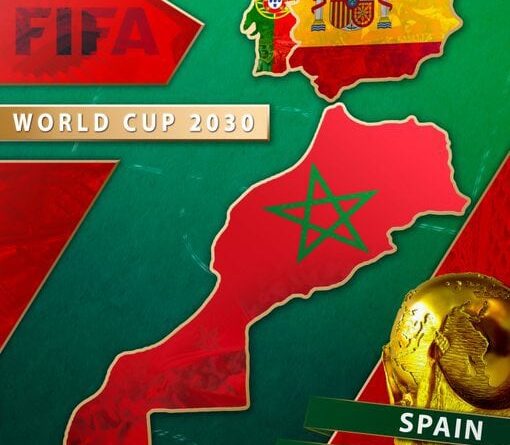2030 FIFA World Cup: Morocco, Portugal and Spain receive good news
With regard to the FIFA World Cup 2030, based on the results of the FIFA technical evaluation, the Morocco, Portugal and Spain 2030 bid received an average score of 4.2 out of 5.
Based on the same technical evaluation, the bids of Argentina, Paraguay and Uruguay (their lone rivals) received an average score of 3.6 out of 5.
Both bids met the minimum hosting
requirements.
Key observations: Morocco / Portugal / Spain 2030
The joint bid submitted by Morocco, Portugal and Spain looks to inspire and unite, using the collective passion for football across the three countries to bring people together and transcend boundaries, further tightening the bonds between two neighbouring continents and the world at large.
This resonates closely with FIFA’s rallying cry
of “Football Unites the World”. Indeed, it is important to emphasise that, should the bid be successful, it will be the first FIFA World Cup hosted across two continents (and three continents when considering the integration of the centenary Celebration).
First and foremost, the joint bid for the FIFA World Cup 2030 presents a very strong all-round proposition, reflected in the results of the technical evaluation, which assesses the proposed infrastructure (both sporting and general) as
well as its commercial potential. The bid proposes a wide variety of generally high-quality venues across 17 diverse host cities, with a combination of existing, iconic and well-established facilities used by some of the most high-profile football clubs in the world, coupled with a number of modernisation projects, whether it be new-builds or upgrades, all of which have very strong legacy use cases.
Whilst the extent of construction projects in the context of a six-year lead time requires close monitoring and support where necessary, there are several mitigating factors, such as the fact that many of stadium projects have already commenced (such as in Morocco, where most are due for completion in time for the CAF Africa Cup of Nations in 2025) as well as the general quality and thoroughness of the plans developed and the visible commitment to the Projects presented, which provide a high degree of confidence. For those existing venues proposed, an important area of attention will be finding the optimal configuration and adaptation of such venues for FIFA World Cup operations.
From a general infrastructure standpoint, the bid also still manages to retain a relatively compact tournament footprint despite the extensive number of venues, with short distances between the proposed venues – all of which would be
viewed in a positive light by the tournament stakeholders.
Commercially speaking, the bid also provides a very good foundation owing to strong forecasts across the key revenue streams (broadcast, sponsorship, matchday revenues, etc.) as well as material cost efficiencies.
The robust and consistent support from the governments of all three countries at the national, regional and city levels, evidenced through the securing of all government guarantees and host city agreements, is a strong signal that the bid has the full backing of many key stakeholders who will be pivotal to the success of the competition in
Per the report, should the bid be successful, one priority area to address would be any material open points arising from the contractual hosting framework (e.g. stadiums, airports, training sites, hotels, etc.) in relation to deviations which were
noted during the bidding process. Taking all aspects into consideration, the bid has clearly demonstrated the capacity to successfully host the FIFA World Cup 2030. If the bid be successful, FIFA looks forward to working together with the appointed hosts from the outset to deliver a world-class and memorable edition of the FIFA World Cup – one which represents the last in a century of FIFA World Cups – leaving an important and far-reaching legacy for football and its global community.
Key observations: Argentina / Paraguay / Uruguay
“Centenary Celebration bid”
The bid by Argentina, Paraguay and Uruguay centres around the emotional and inspiring experience that the three countries would be able to deliver fans through the tournament’s return to its historic roots and the continent’s obsession with football.
The bid confirms the capacity of the three countries to host a spectacular Centenary Celebration to commemorate the 100-year anniversary of the first FIFA World Cup which took place in South America.
Buenos Aires presents a combination of very good sporting and general infrastructure, ranging from a world-class stadium (Monumental) used to hosting major football events and suitable training sites to ample accommodation
and transport infrastructure. Indeed, the extensive capacity of the city provides a firm foundation to support the other two host cities, potentially serving as a hub if and when necessary.
When it comes to Montevideo and Asunción, exciting projects and modernisation efforts are underway, including the planned renovation of iconic stadiums in both proposed host cities, further enhancing the appeal and suitability of
these venues as ideal locations for the celebration. Key areas that will require further attention principally relate to general infrastructure (i.e. transport and accommodation), where capacity levels currently appear to be close to the
limit of the tournament requirements.
Addressing these issues will help ensure a seamless and positive experience
for all tournament stakeholders.
Taking all aspects into consideration, all three countries have demonstrated the capacity to successfully host the momentous occasion that is the Centenary Celebration.
However, the report received is just an evaluation. The bids may therefore be considered by the FIFA Council for submission to the FIFA Congress ahead of the selection of the host(s) of the FIFA World Cup 2030 and the Centenary Celebration, with an official decision awaited.




